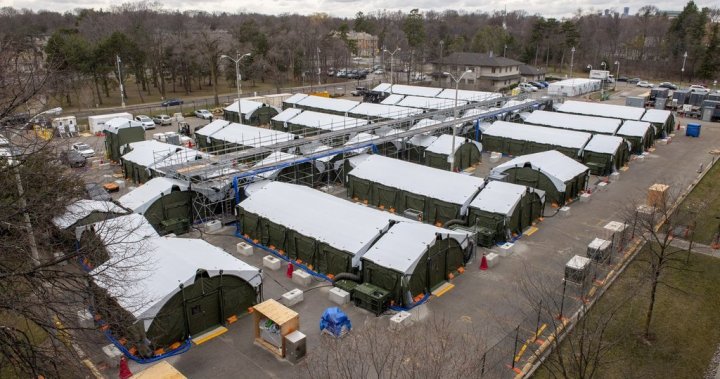Dans l’ombre de la réponse canadienne à la pandémie se trouve une installation de 300 millions de dollars qui n’a jamais traité un seul patient. Le gouvernement fédéral a discrètement commencé à chercher des acheteurs pour son unité de santé mobile à Montréal, construite au plus fort des craintes de la COVID-19 mais restée complètement inutilisée alors que la pandémie s’estompait.
Cet hôpital temporaire de 144 lits, rapidement aménagé dans un entrepôt reconverti près de l’Aéroport international Pierre-Elliott-Trudeau, représente un symbole frappant des décisions d’approvisionnement de l’ère pandémique maintenant soumises à un examen accru. Services publics et Approvisionnement Canada a confirmé la semaine dernière qu’ils commercialisent activement l’installation auprès d’acheteurs potentiels, espérant récupérer au moins une partie de l’investissement substantiel.
“L’unité de santé mobile a été construite comme mesure de contingence prudente pendant une période d’incertitude significative,” a expliqué Jean-François Arsenault, porte-parole de Services publics et Approvisionnement Canada. “Bien qu’elle n’ait finalement pas été nécessaire pour son objectif prévu, la décision reflétait l’engagement du gouvernement envers la préparation durant une crise de santé publique sans précédent.”
Des documents obtenus par des demandes d’accès à l’information révèlent que le gouvernement a dépensé environ 300 millions de dollars pour le développement, le personnel et l’entretien de l’installation entre 2020 et 2023. Le contrat, attribué à SNC-Lavalin sans appel d’offres concurrentiel en vertu des règles d’approvisionnement d’urgence, a soulevé des questions sur la surveillance fiscale pendant la réponse à la crise.
Le député conservateur Michael Barrett, critique en matière de santé du parti, a qualifié l’hôpital inutilisé de “monument à la mauvaise gestion libérale” lors d’un échange houleux à la Chambre des communes jeudi dernier. “Les Canadiens ont eu du mal à accéder aux soins de santé tout au long de la pandémie pendant que des centaines de millions étaient gaspillés pour une installation qui n’a jamais ouvert ses portes,” a déclaré Barrett.
Les experts en politique de santé offrent une perspective plus nuancée. Dre Katharine Smart, ancienne présidente de l’Association médicale canadienne, suggère que de tels investissements devraient être évalués dans leur contexte historique.
“Au printemps 2020, les systèmes de santé du monde entier faisaient face à une incertitude sans précédent,” a déclaré Smart à CO24 dans une entrevue. “Bien qu’il soit facile de critiquer ces décisions rétrospectivement, la planification d’urgence lors de scénarios potentiellement catastrophiques implique nécessairement des investissements qui peuvent ultimement s’avérer inutiles.”
L’installation de Montréal n’est pas unique. Plusieurs provinces ont construit des installations d’urgence similaires, bien que la plupart aient été au moins partiellement utilisées. Les unités mobiles de l’Ontario ont brièvement traité des patients en surplus pendant le pic de la pandémie, tandis que les installations d’urgence de la Colombie-Britannique ont été partiellement utilisées lors des vagues subséquentes.
Le gouvernement fédéral n’a pas divulgué son prix demandé pour l’unité de Montréal mais a confirmé que










